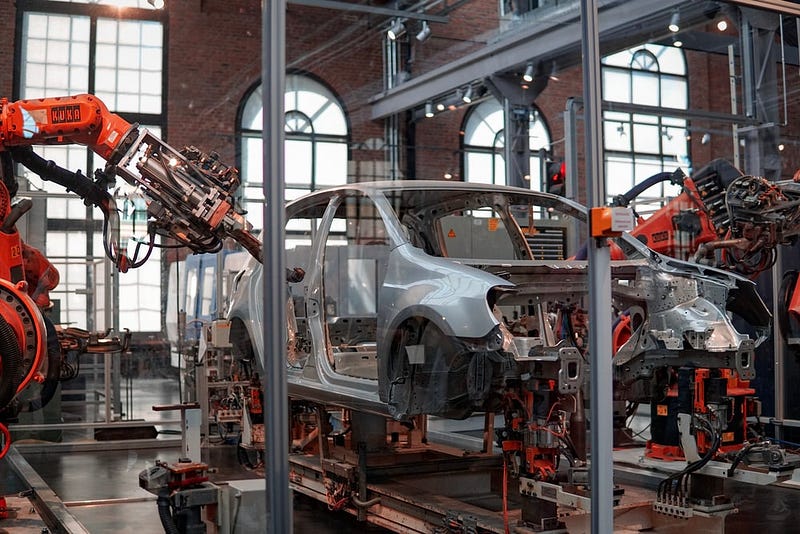The Future of Work: Navigating Automation's Impact on Society
Written on
Chapter 1: The Looming Shadow of Automation
As we gaze into the next couple of decades, our economy presents a myriad of challenges that obscure our ability to foresee the future. Currently, inflation has surged to levels not seen in four decades, while income inequality continues to escalate, reaching heights previously recorded before the pandemic.
Concerns surrounding the national debt have also intensified, now exceeding thirty trillion dollars and doubling in the last decade. The post-World War II comparison of debt to GDP is no longer applicable. Amid these pressing issues, one longstanding threat is poised to gain momentum: automation. Initially a concern for auto-worker unions and other specific sectors, it now jeopardizes numerous jobs across the entire economic spectrum. Among all these looming threats, automation may emerge as the most disruptive force in the years ahead.
What will the landscape look like? How will our economy adapt? The reluctance to address this unavoidable transformation in our working lives suggests we are not adequately prepared for the changes on the horizon. Preparation is essential.
A prevalent theme in my writings is the constant challenges faced by the working class and lower-middle class. This isn’t a startling revelation; rather, it’s an ongoing narrative, reminiscent of the Olympics—discussed for a few weeks during election cycles and then largely forgotten. We acknowledge the issue exists, yet we continue on our path. While the current situation isn’t favorable for anyone, life persists.

Chapter 2: Automation's Disruption of Employment
The dynamics of automation are not subtle; they represent a significant threat rather than a gentle nudge. Instead of quietly trimming the workforce, automation acts like a powerful saw, creating chaos while intensifying existing class and political divides. This is a serious concern.
The frustrations of the working class have been thoroughly documented, and if their economic struggles worsen compared to today's already challenging climate, the outcomes could be dire. Over the past few decades, we've witnessed stagnant wages and limited opportunities for the working class. Many upcoming roles at risk of automation affect the same demographics that have suffered for years. More alarmingly, many of those facing job loss may not even align with this group.
It’s a common misconception that automation only threatens factory and warehouse jobs. In reality, technological advancements are infiltrating every sector. If your job involves routine tasks, consider yourself vulnerable.
Software is now capable of reading and interpreting documents. For instance, an application on my screen is currently analyzing this article and indicating that it sounds anxious. Indeed, I am concerned—thank you, Grammarly.

As automation encroaches on lower-tier office positions, society may face a significant reckoning. Administrative roles are among the first likely to be replaced. Many applications have already automated a substantial portion of their responsibilities, with advanced document processing software on the horizon.
While some individuals who receive a high volume of emails may still desire human assistance in managing their communications, this need may diminish significantly. The number of people in such positions is greater than we often realize.
Reflecting on a commercial lender's conference I attended years ago, which typically featured the same 200 attendees indulging heavily, I noticed an unexpected influx of participants. It turned out that an administrative assistants' convention was simultaneously taking place, drawing over 3 million attendees.
Furthermore, any role with "clerk" in the title is at risk, as these positions typically involve repetitive tasks and data entry. The sheer number of individuals in these jobs is staggering—payroll clerks, claims clerks, and loan processors, to name a few.
These positions are not being replaced by new tech roles on a one-to-one basis. Even if they were, how many individuals over 50 are willing or able to undergo retraining for a new job in a field that skews younger? By the time automation impacts these roles, entry-level jobs may have vanished entirely.
Think broadly about the next round of automation - This video discusses the broader implications of automation on various job sectors and the economy as a whole.
Chapter 3: The Impact on Youth Employment
Youth unemployment is another critical aspect to consider. Many of us began working before we could drive and held an array of entry-level jobs—caterers, loaders, and retail employees.
While these roles may not relate directly to our current careers, they were foundational in shaping our work ethic and interpersonal skills. I can only speculate about where I would be without those experiences.
Many peers worked as cashiers or in retail—positions now at risk of automation. What happens to these young individuals if their opportunities for formative experiences disappear?
High youth unemployment deserves more attention than it currently receives. A resume without work experience from someone in their 20s raises red flags, but what if that lack of experience is out of their control?
Research indicates that youth unemployment can have lasting negative effects, a topic worthy of further exploration. As we look to the future, this concern should be elevated in discussions about automation.
Going All In On Automation - This video examines the implications of automation on the job market, highlighting challenges and opportunities for future employment.
Chapter 4: Urgent Measures Needed
Addressing generational problems rarely yields quick solutions. We must begin envisioning the future of our economy and society, laying the groundwork now for what is to come. Once millions find themselves unemployed, it will be too late to act.
For many, these entry-level corporate roles serve as stepping stones to advancement—especially for those without a four-year degree. We should explore ways to differentiate employees and provide them access to opportunities in a job market where these roles are dwindling.
Many corporate leaders have ascended through similar ranks; they should empathize with those now facing job insecurity. While not everyone will gravitate towards technology, sufficient interest exists to promote these career paths in high school.
The education system and government must collaborate to avert potential crises. Offering paid vocational training in lower-end IT positions could effectively address youth unemployment.
In recent years, tech CEOs have advocated for universal basic income as a buffer against the fallout of automation. Their motives are not rooted in liberal ideals but rather in foresight regarding the trajectory of their industries. Even if we successfully mitigate some impacts of automation, millions will remain displaced, some permanently. Our societal framework must be equipped to handle this shift.
We must initiate serious, policy-driven discussions about our path forward. Corporate leaders have voiced these concerns for years with minimal progress. It may be time to amplify their voices for change.
For free personal finance resources, calculators, and more, visit the MOAM reader resource page.
This article is intended for informational purposes only and should not be construed as financial or legal advice. Always consult a financial professional before making significant financial decisions.